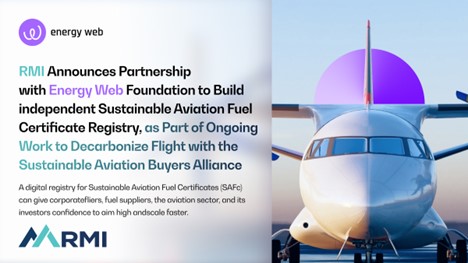
RMI Partners with Energy Web Foundation to Build Sustainable Aviation Fuel Certificate Registry, as Part of Ongoing Decarbonization Work with the Sustainable Aviation Buyers Alliance
A digital registry for sustainable aviation fuel certificates (SAFc) can give corporate fliers, fuel suppliers, the aviation sector, and its investors confidence to aim higher and scale faster.
Boulder, CO – November 16, 2022
RMI and Energy Web Foundation today announced that they will build a digital registry for sustainable aviation fuel (SAF) certificates that will bring more transparency to emissions reduction claims about air travel. The registry will also support and accelerate the deployment of sustainable aviation fuels that drastically reduce lifecycle emissions from air transport.
The registry will support ongoing work with the Sustainable Aviation Buyers Alliance (SABA), a coalition of corporate buyers and aviators committed to decarbonizing aviation, co-founded by RMI and the Environmental Defense Fund
“RMI is very excited to see this crucial tool to fruition,” said Bryan Fisher, managing director for RMI’s Climate-Aligned Industries Program. “A transparent, easy-to-use registry built on a rigorous accounting approach will lift public confidence in SAF emissions reduction claims, propel investment in SAF production, and accelerate decarbonization of the aviation sector.”
SAF is a drop-in fuel made with renewable or waste feedstocks that can decrease the lifecycle emissions of flight by up to 99 percent. Currently, SAF production is insufficient to meet demand from corporate flyers that aim to decarbonize flights taken by their employees and goods.
“The SAF certificate registry will help drive the market toward high quality fuel by providing detailed data on the environmental quality and associated certifications of each gallon of SAF. As a result, aviation customers will be able to choose a truly sustainable solution,” said Angela Churie Kallhauge, Executive Vice President for Impact at Environmental Defense Fund.
The SAF certificate registry will help drive the market toward high quality fuel by providing detailed data on the environmental quality and associated certifications of each gallon of SAF. As a result, aviation customers will be able to choose a truly sustainable solution,” said Angela Churie Kallhauge, Executive Vice President for Impact at Environmental Defense Fund.
SAF certificates enable companies and other aviation customers to pay for the environmental benefits (such as emissions reductions) of SAF, even if the physical fuel is not yet available for their flights. Decoupling the environmental attributes of SAF from the physical fuel will democratize access to SAF’s benefits and catalyze SAF supply at scale. A digital registry in which SAFc can be securely and consistently issued, transferred, and retired is critical to ensure that these certificates represent unique and verified emissions reduction claims.
“This registry is a wonderful opportunity to showcase how technology can bring transparency and trust to complex supply chains like SAF,” said Jesse Morris, CEO at Energy Web. “And by building the registry open source, the SAF industry can help other hard-to-decarbonize sectors understand what’s possible with digital technology.”
The registry will enable SAF suppliers, airlines, corporate flyers, freight carriers, logistics service providers, and freight shippers to demonstrate and verify that the SAF and SAFc they invest in meets specific sustainability criteria linked to certifications of each fuel’s supply chain. It will support companies’ ability to make auditable claims about their investments in climate disclosures.
“The development of the SAFc registry represents the first major milestone for the Sustainable Aviation Buyers Alliance, making good on our promise to break down roadblocks and create the tools necessary to decarbonize the aviation sector,” said Kim Carnahan, head of SABA’s Secretariat and Senior Director for Net Zero Fuels at Engie Impact.
The SAFc registry is expected to go live in mid-2023.

Media inquiries please contact:
Alexandra Jardine Wall, Strategic Communications Manager for the Climate-Aligned Industries Program, RMI. Email: awall@rmi.org
Daniyal Ajdadi, Director of Marketing and Communications, Energy Web Foundation. Email: daniyal.ajdadi@energyweb.org
About RMI
RMI, founded as Rocky Mountain Institute, is an independent nonprofit founded in 1982 that transforms global energy systems through market-driven solutions to align with a 1.5°C future and secure a clean, prosperous, zero-carbon future for all. We work in the world’s most critical geographies and engage businesses, policymakers, communities, and NGOs to identify and scale energy system interventions that will cut greenhouse gas emissions at least 50 percent by 2030. RMI has offices in Basalt and Boulder, Colorado; New York City; Oakland, California; Washington, D.C.; and Beijing. More information on RMI can be found at www.rmi.org or follow us on Twitter @RockyMtnInst.
About Energy Web Foundation
Energy Web is a global non-profit accelerating the clean energy transition by developing open-source technology solutions for energy systems. Our enterprise-grade solutions improve coordination across complex energy markets, unlocking the full potential of clean, distributed energy resources for businesses, grid operators, and customers. Our solutions for enterprise asset management, data exchange, and Green Proofs, our tool for registering and tracking low-carbon products, are underpinned by the Energy Web Chain, the world’s first public blockchain tailored to the energy sector. The Energy Web ecosystem comprises leading utilities, renewable energy developers, grid operators, corporate energy buyers, automotive, IoT, telecommunications leaders, and more. More information on Energy Web can be found at www.energyweb.org or follow us on Twitter @EnergyWebX